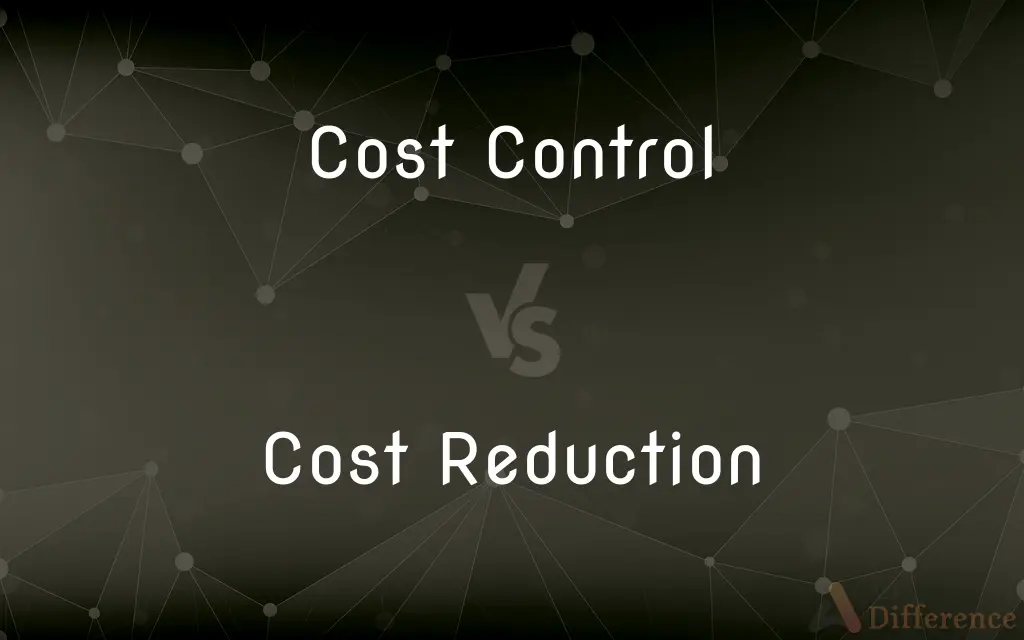Cost Control vs. Cost Reduction — What's the Difference?
Edited by Tayyaba Rehman — By Fiza Rafique — Published on December 18, 2023
Cost Control aims to keep costs within set limits, ensuring no overruns. Cost Reduction seeks permanent reductions in costs without compromising product quality or output.

Difference Between Cost Control and Cost Reduction
Table of Contents
ADVERTISEMENT
Key Differences
Cost Control refers to the systematic approach to monitor and maintain expenses within a predetermined budget or standard. On the contrary, Cost Reduction emphasizes a sustained decrease in the unit cost of goods produced or services provided.
With Cost Control, the focus is primarily on avoiding deviations from an established benchmark or budget. Cost Reduction, however, consistently aims at finding new methods or techniques to reduce costs, even if current expenses are within budget.
Cost Control is a short-term approach, ensuring that business operations don't exceed the set budget within a given period. In contrast, Cost Reduction adopts a long-term perspective, continually striving to achieve efficiencies and cut unnecessary costs.
It's essential to understand that Cost Control sets a threshold, ensuring costs don't surpass it. Cost Reduction doesn't necessarily have an upper limit; it continually seeks opportunities to decrease expenses and improve profitability.
While both Cost Control and Cost Reduction aim at enhancing the profitability of a business, their approaches differ. Cost Control is about maintaining equilibrium, whereas Cost Reduction aggressively targets and eliminates inefficiencies.
ADVERTISEMENT
Comparison Chart
Primary Focus
Maintaining costs within a budget.
Continuously decreasing costs.
Term
Short-term.
Long-term.
Nature
Reactive (responding to overruns).
Proactive (seeking efficiencies).
Limit
Has an upper threshold.
No defined upper limit.
Impact on Quality/Output
No compromise on quality/output.
Reduction without affecting quality/output.
Compare with Definitions
Cost Control
A method to ensure costs don't exceed set limits.
The finance team employed strict Cost Control measures this quarter.
Cost Reduction
A sustained decrease in costs enhancing profitability.
The new machinery facilitated a notable Cost Reduction.
Cost Control
Oversight of expenses to avoid budgetary overruns.
The new software offers enhanced Cost Control features.
Cost Reduction
The ongoing process of decreasing unit cost of goods or services.
Innovative sourcing led to significant Cost Reduction in manufacturing.
Cost Control
The process of monitoring and regulating business expenses.
Effective Cost Control prevented the project from going over budget.
Cost Reduction
Efforts to reduce costs without compromising quality.
The team focused on Cost Reduction while maintaining product excellence.
Cost Control
Measures taken to keep costs in check.
The company's Cost Control strategies have proven successful.
Cost Reduction
Strategies to permanently cut down expenses.
The merger resulted in substantial Cost Reduction due to synergies.
Cost Control
Systematic management of costs within a defined boundary.
With diligent Cost Control, the event remained within its allocated funds.
Cost Reduction
Continuous search for efficiencies to cut expenses.
Through lean methodologies, Cost Reduction became a company priority.
Common Curiosities
Is Cost Control a short-term strategy?
Generally, Cost Control has a short-term focus, ensuring costs align with set budgets over specific periods.
How is Cost Reduction different from Cost Control?
Cost Reduction focuses on permanently decreasing costs, while Cost Control aims to stay within budgetary limits.
Can Cost Reduction affect product quality?
Ideally, Cost Reduction seeks to decrease costs without compromising product quality or output.
What is Cost Control?
Cost Control is the process of monitoring and ensuring expenses don't exceed a set budget or limit.
Is Cost Control reactive?
Often, Cost Control can be reactive, responding to potential or actual budget overruns.
Which approach is better for long-term growth?
Cost Reduction, with its focus on permanent efficiencies, often aligns better with long-term growth.
Why is Cost Control important?
Cost Control prevents budget overruns, ensuring financial stability and predictability.
Are there limits to Cost Reduction?
While there's no defined upper limit, Cost Reduction should always consider product quality and business sustainability.
Can Cost Reduction be achieved through innovation?
Absolutely, innovation often leads to more efficient processes, resulting in Cost Reduction.
What drives Cost Reduction initiatives?
Cost Reduction is driven by the pursuit of efficiencies, better methods, and continual improvement.
Are there risks associated with aggressive Cost Reduction?
If not managed properly, aggressive Cost Reduction can affect employee morale, product quality, or long-term growth.
Can a company practice both Cost Control and Cost Reduction?
Absolutely, many companies integrate both approaches to optimize financial performance.
Can technology aid in Cost Control?
Yes, various software and tools can help monitor and regulate expenses for better Cost Control.
Do both strategies enhance profitability?
Yes, both Cost Control and Cost Reduction aim to improve the bottom line, though their approaches differ.
Does Cost Control involve setting a budget?
Yes, Cost Control often starts with setting a budget and then ensuring adherence to it.
Share Your Discovery

Previous Comparison
Polar Dielectrics vs. Nonpolar Dielectrics
Next Comparison
Population Growth vs. Population ChangeAuthor Spotlight
Written by
Fiza RafiqueFiza Rafique is a skilled content writer at AskDifference.com, where she meticulously refines and enhances written pieces. Drawing from her vast editorial expertise, Fiza ensures clarity, accuracy, and precision in every article. Passionate about language, she continually seeks to elevate the quality of content for readers worldwide.
Edited by
Tayyaba RehmanTayyaba Rehman is a distinguished writer, currently serving as a primary contributor to askdifference.com. As a researcher in semantics and etymology, Tayyaba's passion for the complexity of languages and their distinctions has found a perfect home on the platform. Tayyaba delves into the intricacies of language, distinguishing between commonly confused words and phrases, thereby providing clarity for readers worldwide.














































